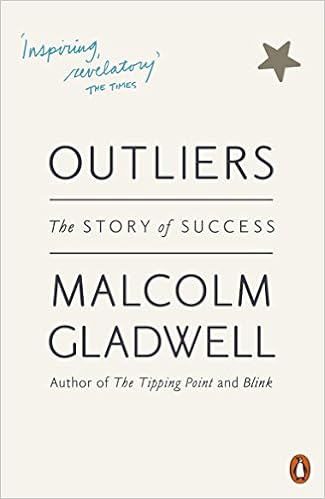Book #08
Outliers: The Story of Success by Malcolm Gladwell
Malcolm Gladwell takes us on an intellectual journey through the world of "outliers" - the best and the brightest, the most famous and the most successful. He asks the question: what makes high-achievers different?His answer is that we pay too much attention to what successful people are like, and too little attention to where they are from: that is, their culture, their family, their generation, and the idiosyncratic experiences of their upbringing. Along the way he explains the secrets of software billionaires, what it takes to be a great soccer player, why Asians are good at math, and what made the Beatles the greatest rock band.
We've all heard of 'self-made men' rising like phoenixes from the ashes to make their mark on the world. They earn respect, they earn money, they earn immortality. We're led to believe this is due them being born with some innate talent, some irrepressible font of knowledge within them, some quality that they've grown and nurtured just to share with us and showcase their genius.
Gladwell's argument is that this is not so, that there's simply no such thing as a self-maker. Gladwell believes that success is borne purely from opportunity, and how tightly we grasp it. He explores the worlds of hockey players, software tycoons, rockstars, and Chinese rice farmers. He shows us their origins, their culture, and their opportunity, then compares each of them to the other. I realise this sounds absolutely off the charts - how can one compare a Chinese rice farmer to a rockstar? - but it works incredibly well.
To go into detail would be to give everything away, but what I will say is that the way Gladwell positions his information is engaging and educating. As a notorious hater of non-fiction books, I enjoyed his thoughts, and particularly enjoyed repeating these to others in a vain attempt to make myself sound intelligent.
I think Gladwell only had to do one more thing to nail this book for me, and he didn't do it. I wanted him to give me a female outlier; a successful and interesting woman for whom I could examine her social and cultural beginnings, understand her rise, and compare her to other moneyed girls. But alas, no woman outliers. Gladwell gave us either wives and mothers - women who had positive impacts on the success of men, but who had no real acclaim of their own to boast of, or he gave us Renee, who sat in front of a maths problem for twenty minutes and didn't manage to solve it. Hardly inspiring, Gladwell.
It's difficult, when reading this book, not to surrender into examining one's own life for missed opportunities. This is a dangerous game, as remembering missed opportunities often is. The fact remains, however, that it's our culture, our families, our environments, and even our birthdays, that create only the possibility of success. After that we need to hold on and work at it for at least ten thousand hours. Get going.

